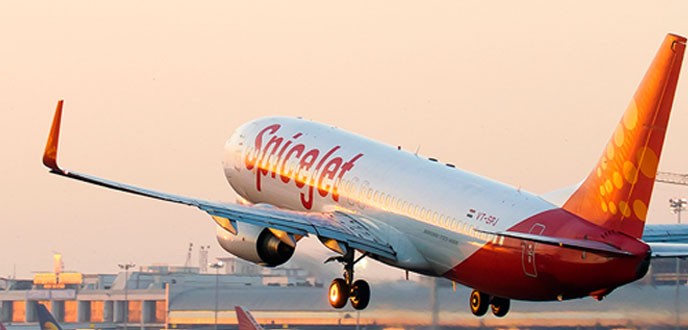SpiceJet set to expand with firm order of 100 new Boeing planes

NEW DELHI : Indian budget airline SpiceJet said on Friday it has agreed to acquire 100 new MAX 737 aircraft from Boeing, with an option for 50 more, as part of its expansion plans in the world’s fastest growing aviation market. The deal is a welcome boost for Boeing in India, where SpiceJet is the U.S. company’s only major customer among the budget carriers now dominating the country’s air industry.
“This is an extremely competitive market,” Ajay Singh, SpiceJet’s chairman, told a news conference in New Delhi. “What this aircraft order does is enhance our ability to be competitive in the future as it helps us reduce costs,” said Singh, whose airline has about 13 percent of the Indian passenger market, while market leader IndiGo has 40 percent.
SpiceJet, which was briefly forced to ground its fleet in late 2014 when it ran out of cash, is the fourth-largest Indian airline behind InterGlobe Aviation’s IndiGo, Jet Airways and state-run Air India.
Asia, especially India, is a key market for planemakers, with analysts expecting Indian passenger numbers to more than triple over the next 20 years as millions more people become wealthy enough to fly for the first time.
Combined, local airlines like IndiGo, as well as GoAir, have already ordered hundreds of new planes from Airbus. Meanwhile Boeing estimates India will need 1,850 new aircraft worth $ 265 billion by 2036 to meet demand for air travel.
SpiceJet said altogether it has signed a deal to acquire up to 205 planes from Boeing, worth up to $ 22 billion at list prices, but that total includes 55 jets already announced in a 2014 deal and the possible follow-on order of 50 more.
A source familiar with the deal had said on Thursday that SpiceJet was set to announce an order for as many as 100 new planes. Boeing had already reported an order for 100 737 MAX jets from an unidentified customer that counted as part of its 2016 tally, and on Friday confirmed that order to be SpiceJet’s. Shares in SpiceJet rose as much as 3 percent on Friday.
SpiceJet, which has a current fleet of more than 40 planes, will take delivery of the first of its new jets in the third quarter of 2018, Dinesh Keskar, senior vice president of Asia Pacific & India Sales at Boeing, told reporters. The carrier is expected to have secured a hefty discount from the aircraft list prices, as is common with large orders.
“As part of this transaction they (Boeing) have not only been kind enough to give us good commercial terms but have worked hard to reduce the maintenance cost of the fleet going forward,” said Singh.
He said he was weighing up various options for financing the new purchase, including sale and leaseback, but he ruled out issuing more debt or raising equity to pay for the planes. The new aircraft increases the range of SpiceJet’s flights by up to one hour, opening up many more destinations, including international ones, Singh told reporters.
He said the additional acquisition rights also include an option to buy wide-body aircraft for long haul journeys as the airline considers launching low-cost long distance flights.
Most Indian carriers have returned to profitability in recent years, thanks in part to lower fuel costs, but challenges remain as carriers struggle to translate surging demand into sustainable profits because of cut-throat competition and high running costs.



